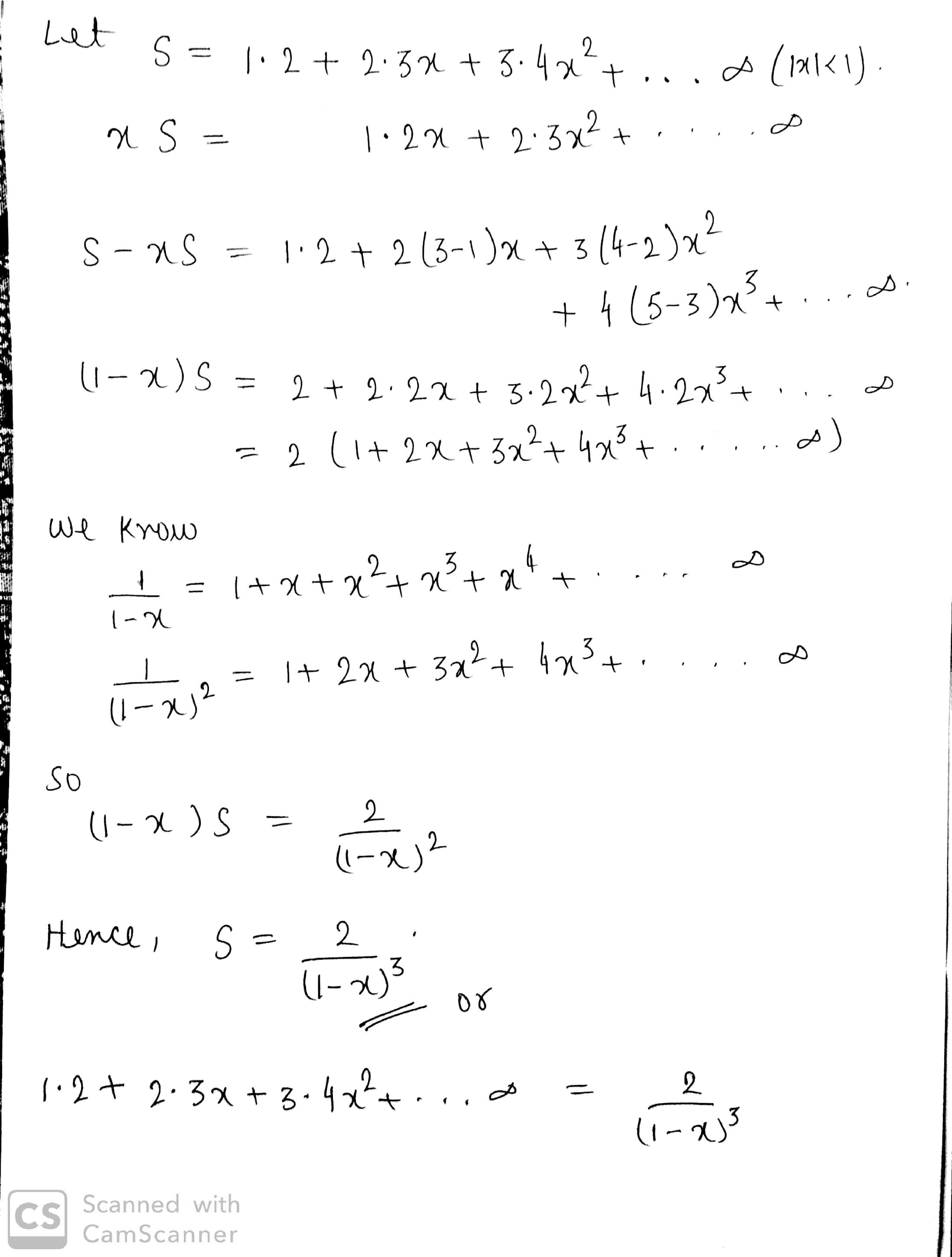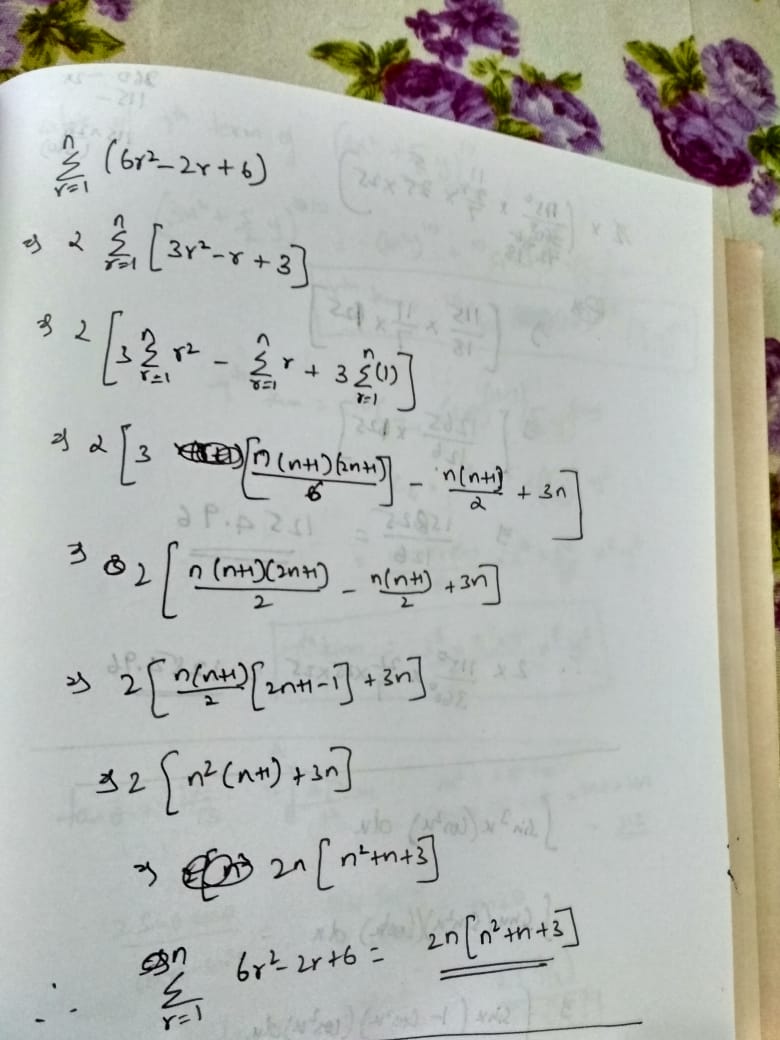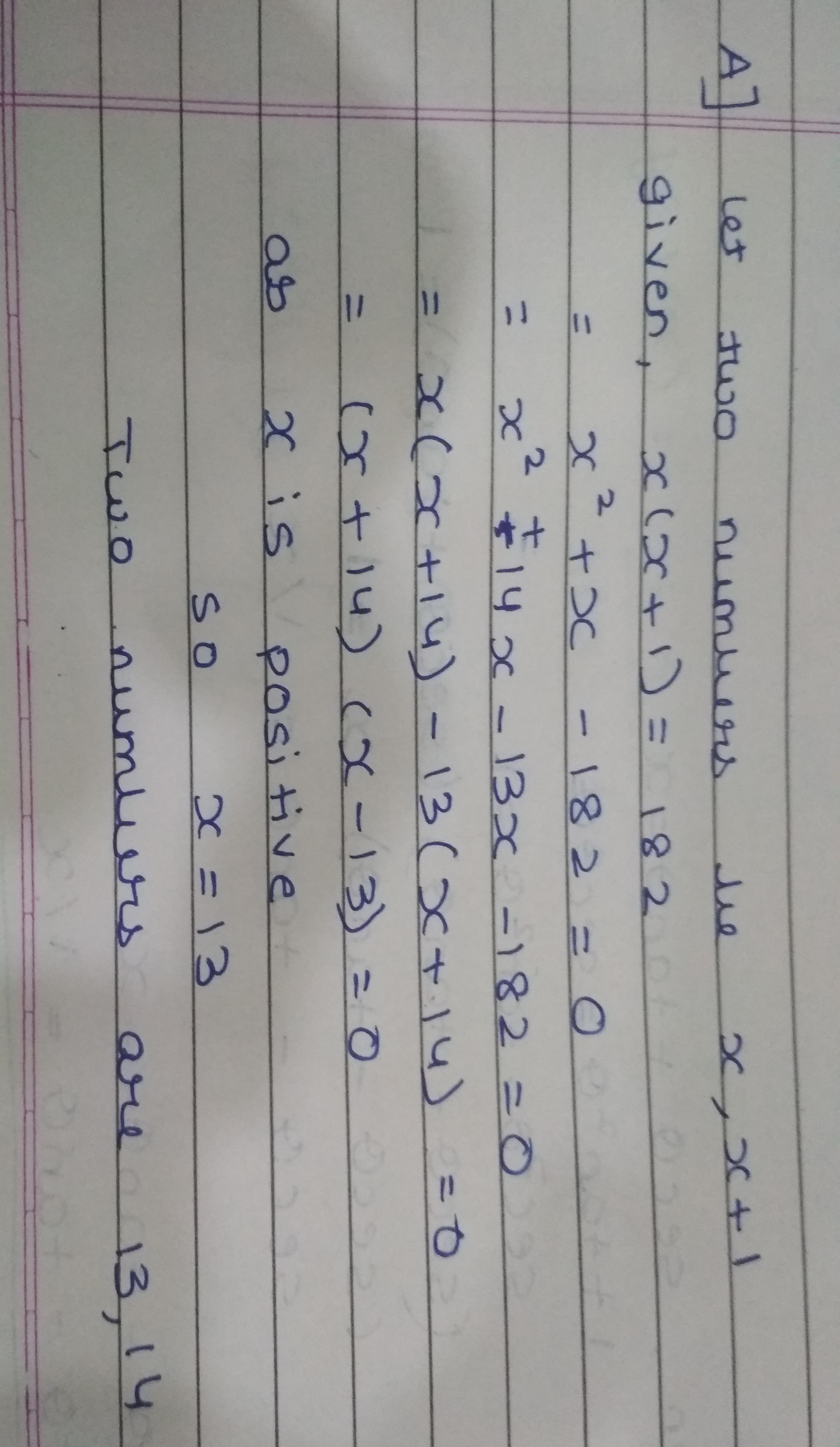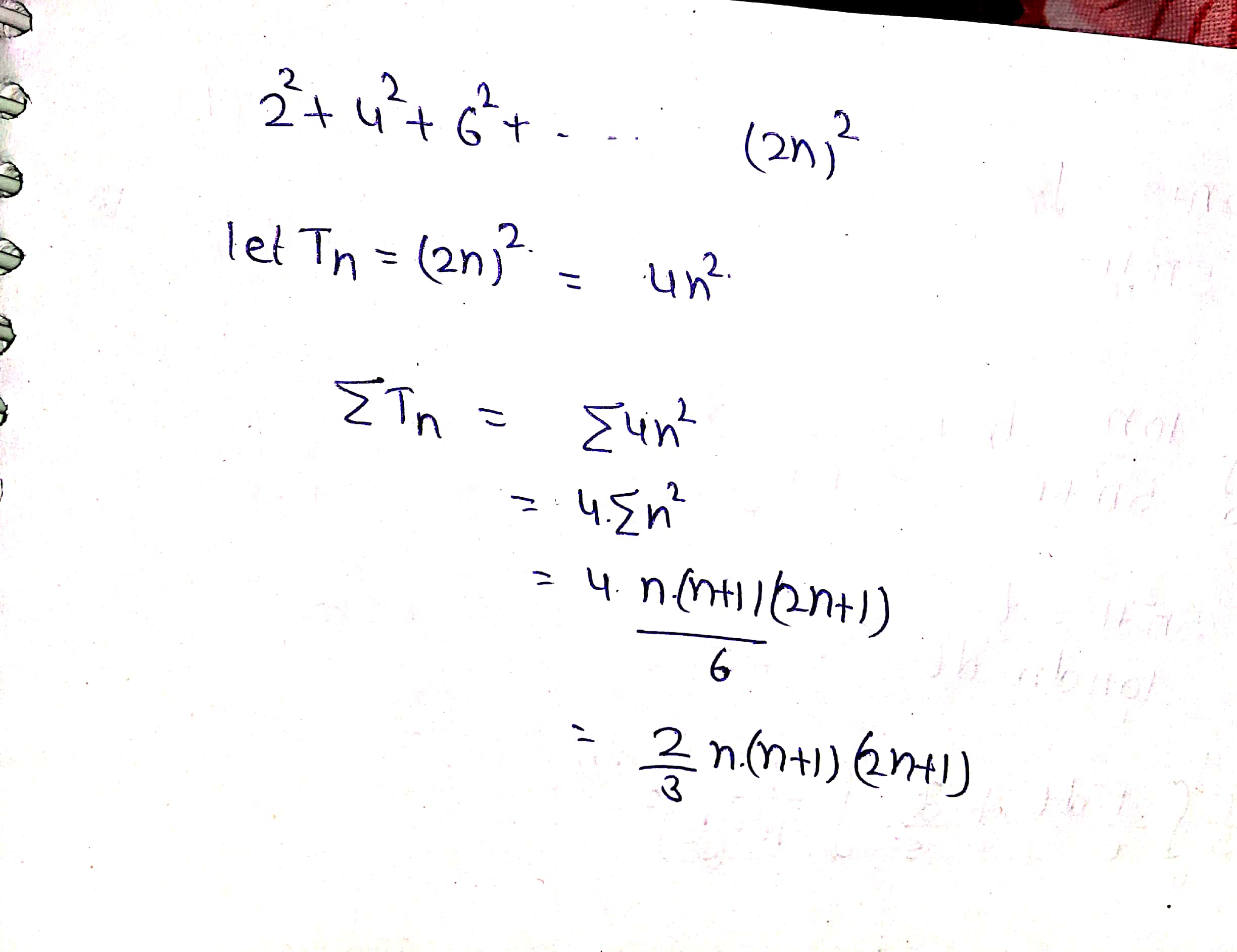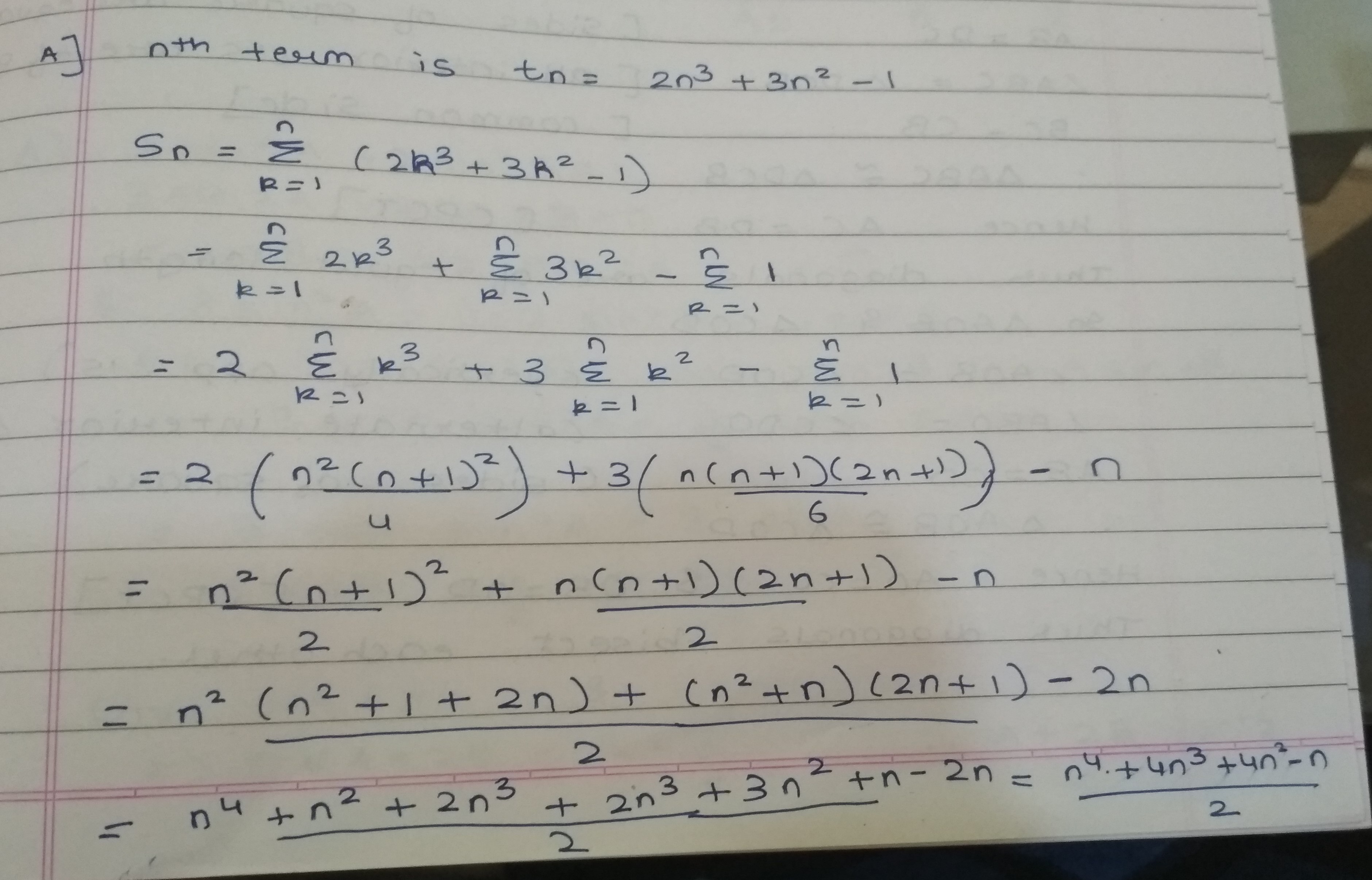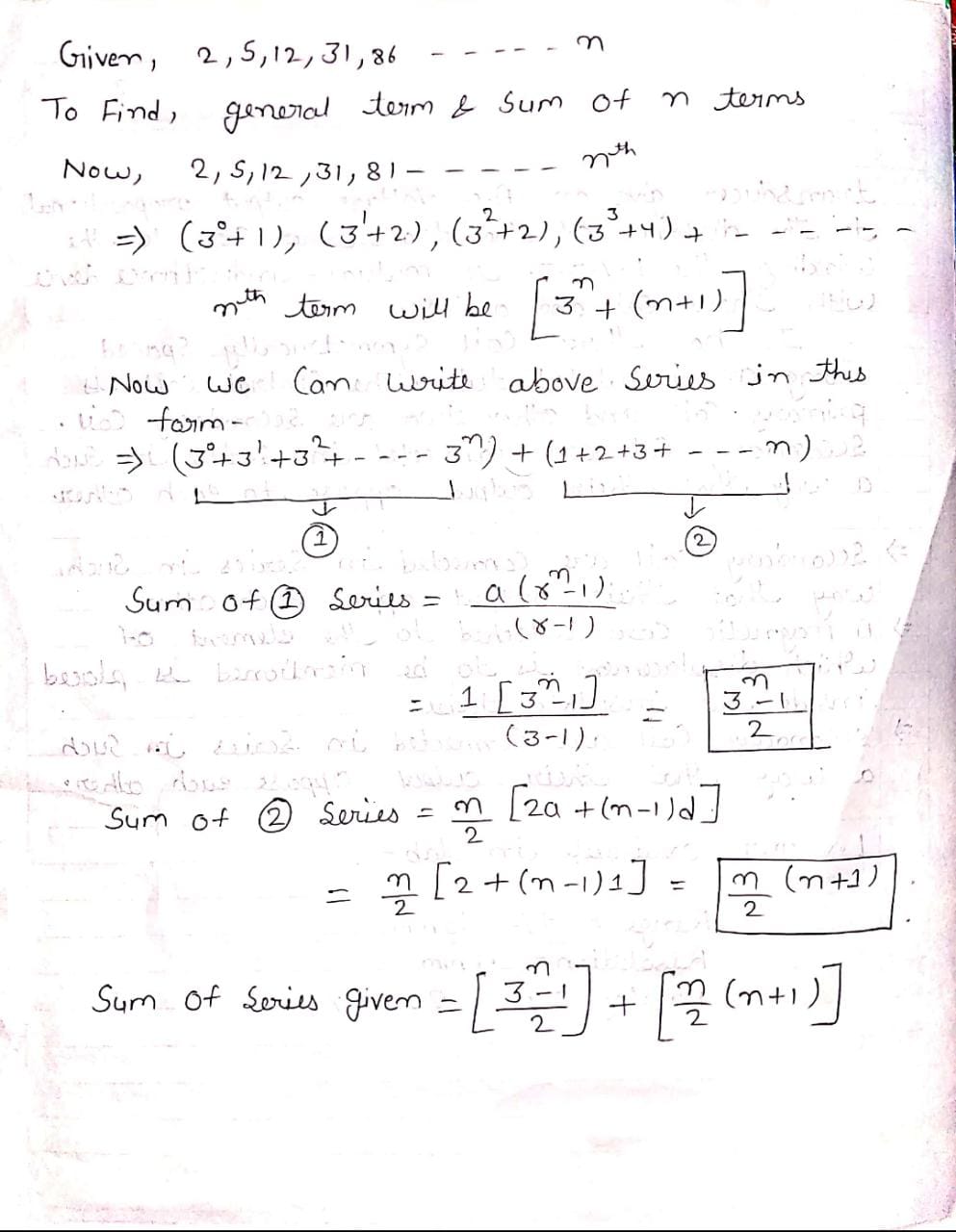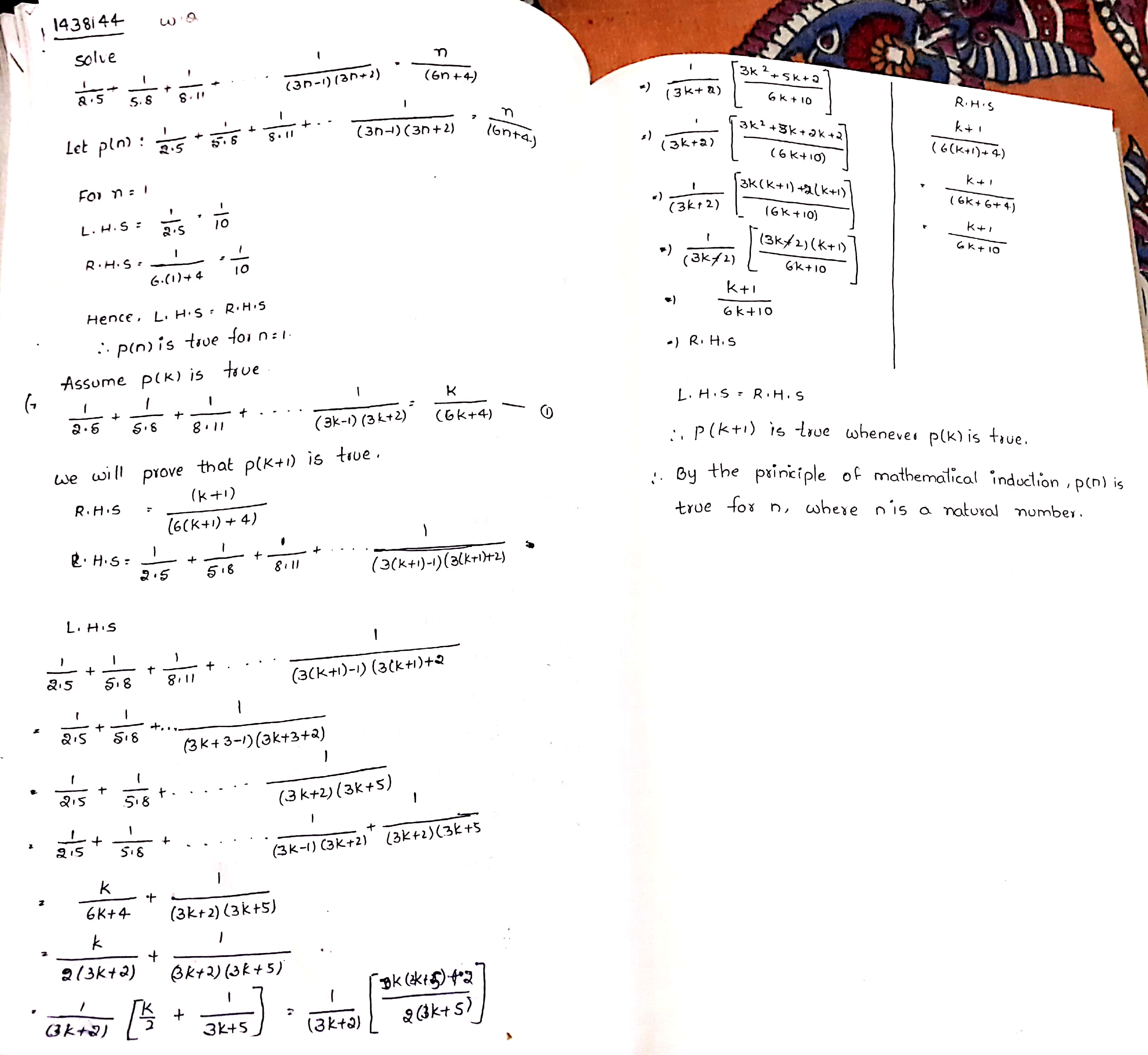Sequences And Series - Class 11 Commerce Maths - Extra Questions
Find the following sum.
$$\sum\limits_{r = 1}^n {\left( {6{r^2} - 2r + 6} \right)} $$
$$1.2 + 2.3x + 3.4x^{2} + ....\infty (|x| < 1)$$.
Write the general term for the given series $$\frac{1}{(n-1)},\frac{1}{3(n-3)},\frac{1}{5(n-5)},....$$
Solve:
$$\displaystyle\sum\limits_{r = 1}^n {\left( {6{r^2} - 2r + 6} \right)} $$
$$\displaystyle\sum\limits_{r = 1}^n {\left( {6{r^2} - 2r + 6} \right)} $$
The product of two consecutive positive numbers is $$182$$. Find the numbers.
Evaluate $$1+i^{2}+i^{4}+i^{6}+...+i^{2n}$$.
What is the sum of first 20 odd natural numbers?
Sum the following series
$$1 + \dfrac {3}{4} + \dfrac {7}{16} + \dfrac {15}{64} + \dfrac {31}{256} + ....$$ to infinity.
Find value of the sum $$\displaystyle \frac{1}{sin45^o sin 46^o} + \frac{1}{sin47^o sin 48^o} + \frac{1}{sin49^o sin 50^o} + ....... + \frac{1}{sin133^o sin 134^o}$$
Let $$a_{1},a_{2},..., a_{n}$$ be fixed real numbers and define a function $$f(x)=(x-a_{1})(x-a_{2})....(x-a_{n})$$.
What is $$\displaystyle \lim _{ x\rightarrow a_{1} }f(x)$$? For some $$a\neq a_{1},a_{2},..., a_{n}$$, compute $$\displaystyle \lim _{ x\rightarrow a }f(x)$$.
If $$\displaystyle\frac{1}{1!10!}+\frac{1}{2!9!}+\frac{1}{3!10!}+...+\frac{1}{1!10!}=\frac{2}{k!}(2^{k-1}-1)$$ then find the value of k.
If $$\beta \, \neq \, 1$$ be any nth root of unity then prove that $$1 \, + \, 3\beta \, + \, 5\beta^2 \, + \, ..... \, + \, n \, terms \, = \, -\dfrac{2n}{1 \, - \, \beta}$$
Let a sequence be defined by $$a_1 = 1, a_2 = 1$$ and, $$a_n=a_{n-1} + a_{n - 2}$$ for all $$n > 2$$,
find $$\dfrac{a_{n + 1}}{a_n}$$ for $$n = 1, 2, 3, 4$$.
A sequence is defined by $$a_n = n^3 - 6n^2 + 11n - 6$$. Show that the first three terms of the sequence are zero and all other terms are positive.
$$\underset{n \rightarrow \infty}{lim} \dfrac{1^P + 2^P + 3^P + ....+ n^P}{n^{P+ 1}}$$ equals-
Evaluate: $$\sum_\limits{r=1}^n (3r-1)(r+1)$$
Evaluate $$\sum _{ k=1 }^{ 11 }{ \left( 2+{ 3 }^{ k } \right) } $$
Solve :
$$ \dfrac {1}{1.2} + \dfrac {1}{2.3} + ...... + \dfrac {1}{n(n+1)} = ? $$
Obtain $$\sum\limits_{r = 2}^{10} {\left( {4{r^2} - 28r + 4a} \right)} $$
Find the sum to $$n$$ terms of the series
$$1.2^{2}+2.3^{2}+3.4^{2}+...$$
Find the sum to n terms of the sequence, $$8, 88, 888, 8888,....$$.
$$\cfrac{1}{1.3.5}+\cfrac{1}{3.5.7}+....$$ to $$n$$ terms.
Find the sum to $$n$$ terms of the series, whose $$n$$th term is given by $${(2n-1)}^{2}$$.
Find the sum of series upto $$n$$ terms whose $${ n }^{ th }$$ term is $${\left( {2n - 1} \right)^2}$$
Find the sum of $$1 + 5 + {5^2} + ....$$ upto 8 terms.
Find the sum of the series $$2 ^ { 2 } + 4 ^ { 2 } + 6 ^ { 2 } + \ldots + ( 2 n ) ^ { 2 }$$
Show that $$1^{2}+(1^{2}+2^{2})+(1^{2}+2^{2}+3^{2})+........$$ upto $$n$$ terms $$=\dfrac{n(n+1)^{2}(n+2)}{12}, \forall n \in N$$
Find the sum of the series whose $$n^{th}$$ term is :
$$2n^{3}+3n^{2}-1$$
$$\left( r+1 \right) ^{ 2 }+\left( r+2 \right) ^{ 2 }+....+{ n }^{ 2 }$$
Find sum of $$n$$ terms of following series ?
$$1 + 3 x + 5 x ^ { 2 } + 7 x ^ { 3 } + \dots$$
For all real numbers $$a, b$$ and positive integer $$n$$ prove that:
$$(a+b)^{n}=^{n}C_{0}a^{n}+^{n}C_{1}a^{n-1}b+^{n}C_{1}a^{n-2}b^{2}+..........+^{n}C_{n}b^{n}$$.
Prove that
$$\dfrac {C_{1}}{C_{0}}+\dfrac {2C_{2}}{C_{1}}+\dfrac {3C_{3}}{C_{2}}+....+\dfrac {n.C_{n}}{C_{n-1}}=\dfrac {n(n+1)}{2}$$
Write the first five terms of the sequence and obtain the corresponding series:
$$a_{1}=a_{2}=2,a_{n}=a_{n-1}-1,n > 2$$
Evaluate:$$\dfrac{1+\dfrac{1}{2!}+\dfrac{1}{3!}+.......}{1+\dfrac{1}{3!}+\dfrac{1}{5!}+.......}$$.
Find the coefficient of $$x$$ in the expansion of $$\left( 1+\dfrac { x }{ 1! } +\dfrac { x^2 }{ 2! } +\dfrac { x^3 }{ 3! } +...+\dfrac { x^n }{ n! } \right) $$
The sum, $$\sum _{ n=1 }^{ 7 }{ \cfrac { n\left( n+1 \right) \left( 2n+1 \right) }{ 4 } } $$ is equal to ________
Determine whether the following series is convergent or divergent$$\displaystyle \frac {1}{1^p}+\frac {1}{3^p}+\frac {1}{5^p}+\frac {1}{7^p}+.....$$
Find the general term and the sum of $$n$$ terms of the series:
$$2,5,12,31,86,......$$
Determine whether the following series is convergent or divergent$$\displaystyle 1+ \frac {1}{2^2}+\frac {2^2}{3^3}+\frac {3^3}{4^4}+\frac {4^4}{5^5}....$$
Determine whether the following series is convergent or divergent$$\displaystyle1 + \frac {2}{5}x+\frac {6}{9}x^2+\frac {14}{17}x^3+....+\frac {2^n-2}{2^n+1}x^{n-1}+....$$
If $$y=x+ x^2 + x^3 + ...\infty$$, where $$|x| < 1$$, then prove that
$$x= \left( \dfrac{y}{1+y} \right)$$
Prove that $$\left(\displaystyle a+\frac{1}{b+}\frac{1}{a+}\frac{1}{b+}\frac{1}{a+}....\right)\left(\displaystyle\frac{1}{b+}\frac{1}{a+}\frac{1}{b+}\frac{1}{a+}....\right)=\displaystyle \frac{a}{b}$$.
Find the sum of the infinite series $$1 + \dfrac{2}{3}.\dfrac{1}{2} + \dfrac{2.5}{3.6}(\dfrac{1}{2})^{2} + \dfrac{2.5.8}{3.6.9}(\dfrac{1}{2})^{3} + ....\infty$$
Find sum of $$3+33+333+3333+$$....... up to n terms.
Find the sum of the series $$(1^2+1)1!+(2^2+1)2!+(3^2+1)3!+......(n^2+1)n!$$
$$3+33+333+.....+$$n terms.
The sum of the series $$\displaystyle \sum _{ k=1 }^{ 62 }{ \frac { 1 }{ \left( k+2 \right) \sqrt { k+1 } +\left( k+1 \right) \sqrt { k+2 } } } $$.
How many three-digit numbers are there with no digit repeated?
Find the sum of the series $$1.3^{2}+2.5^{2}+3.7^{2}+$$ to $$n$$ terms.
Solve:
$$\frac{1}{{2.5}} + \frac{1}{{5.8}} + \frac{1}{{8.11}} + ...\frac{1}{{(3n - 1)(3n + 2)}}$$
Class 11 Commerce Maths Extra Questions
- Binomial Theorem Extra Questions
- Complex Numbers And Quadratic Equations Extra Questions
- Conic Sections Extra Questions
- Limits And Derivatives Extra Questions
- Permutations And Combinations Extra Questions
- Probability Extra Questions
- Relations And Functions Extra Questions
- Sequences And Series Extra Questions
- Sets Extra Questions
- Straight Lines Extra Questions
- Trigonometric Functions Extra Questions
